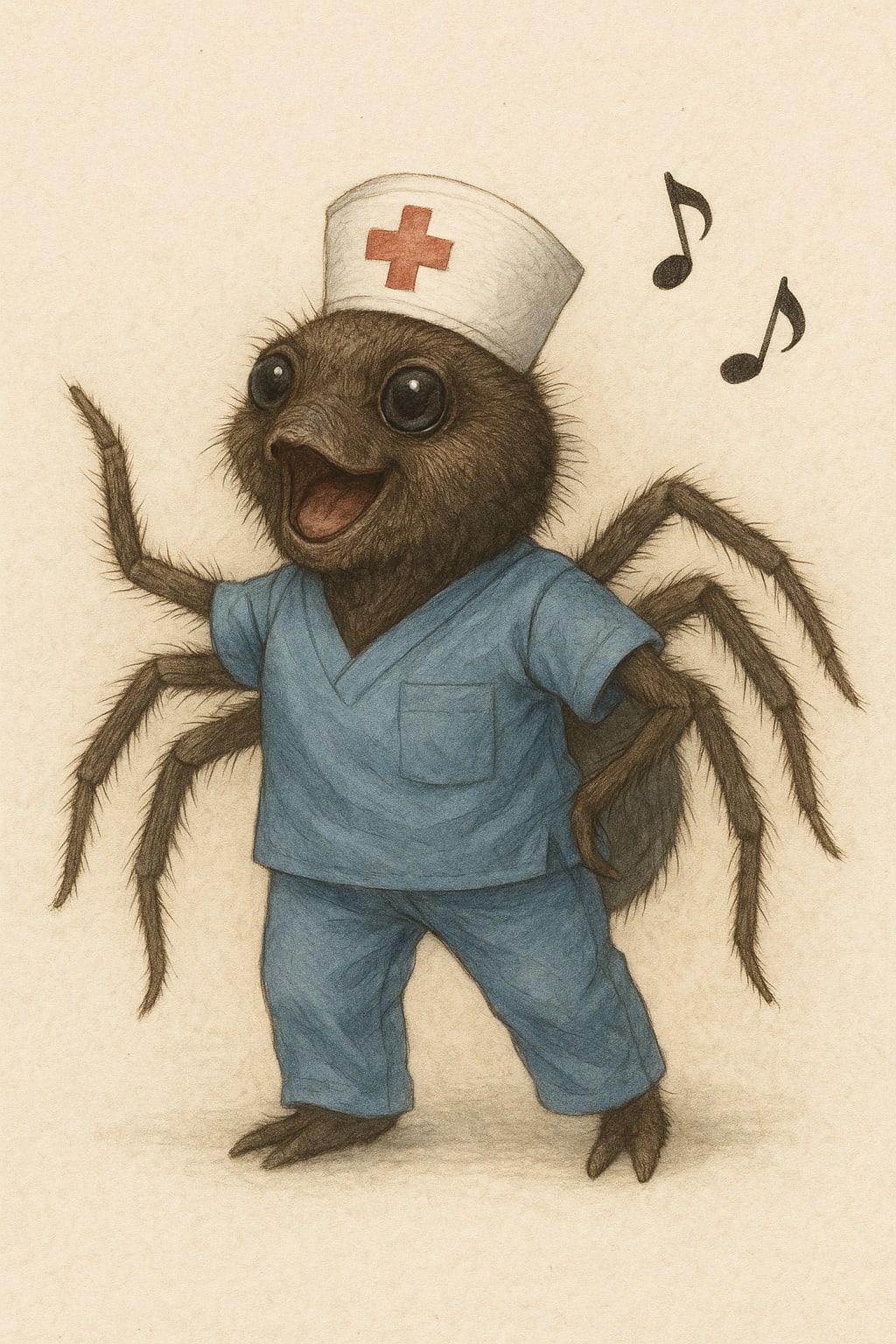Published on November 9, 2025 9:05 PM GMT
This essay contains an examination of handling information which is unpleasant to learn. Also, more references to spiders than most people want.
CW: Pictures of spiders.
I. Litanies and Aspirations
If the box contains a diamond,
I desire to believe that the box contains a diamond;
If the box does not contain a diamond,
I desire to believe that the box does not contain a diamond;
Let me not become attached to beliefs I may not want.
-Litany of Tarski
I read these words when I was around eighteen. They left a strong impression on me. While it's not frequent that I do so aloud, sometimes I respond to learning things have gone wrong by muttering them quietly. I've used them as words of comfort when people are anxiously awaiting important news.
The litany of Tarski is aspirational for me. It isn't always literally true.
If my mother's biopsy contains breast cancer, I really want the biopsy to contain no breast cancer. I am attached to that belief. Of course, the exact text of Tarski's litany is "I desire to believe that the box contains a diamond" not "I desire that the box contained a diamond."

I still try to be the kind of person who hears the positive test result, breathes in, breathes out, and instead of denying it asks what I can do to help.
II. You've Got Mail Spiders
Once upon a time I got called up to assist with handling an interpersonal conflict where many people were mad. I saw a message in my inbox asking a question, and I answered it, and then I got complained about. Sure, comes with the territory. Another message came in, with another question, which I answered, and got complained about. A third message, which I responded to with a question, and then someone called me up and complained at me.
I like learning things. I learned how to play Halo by sitting down with a professional Halo player and losing deathmatches all summer. I taught myself to juggle by standing in a park and dropping balls for six hours. Urist McDeity help me, I learned how to play Dwarf Fortress without a wiki. The way I learn things is to try and do them, paying close attention to whether it works, and changing what I’m doing until it works.
This proved to be a surprisingly bad idea when trying to help handle a conflict, because every single move I made got somebody mad at me.
"You can't live life without anyone getting mad at you," you might say, "and trying is a bad idea." If you're feeling a bit stronger or you happen to be a blunter person, you might add "If you want everyone to like you, you shouldn't be trying to do conflict management. Being conflict averse is bad for that."
Fair points! But I'd like to make counterspiders. I mean counterarguments.

First, I don't think I was being conflict averse. I accepted a role I knew would involve people being mad at me, since this rough genre of problem was the thing that caused my predecessor to quit. I spent easily a dozen hours a year politely trying to advise, deescalate, and make good decisions while people did things like yell "What the fuck?!?" at me or cried into a camera on a videocall.
Second, I think there's a very narrow band of emotional and mental states that can both be empathetic and step back into conflict. Imagine someone who doesn't have any negative reaction to the negative emotions of others or even genuinely enjoys them, feeling warm and happy when people rage or weep. Is that person going to deescalate arguments, or escalate them? The opposite of "conflict averse" is "conflict prone" and someone who is conflict prone seems unsuitable as a community health contact. I would have taken much less negative reinforcement if I'd stopped trying to connect with people or empathize with them.
Aversion is a dislike or disinclination, and to the extent I'm conflict averse I think it was learned, not innate. Because I was paying such close attention to how my thoughts were tracking, I noticed I was predicting everything I’d try would get someone mad at me. I tried one thing after another, exploring the terrain and asking for advice and trying clever ideas and being careful.
It didn't help; every attempt brought a new round of criticism and complaint. I noticed I felt a mental flinch when I went to open emails from participants, then a flinch when I went to open my inbox at all, and eventually a flinch when I went towards my desk in the first place. I eventually spotted myself with that mental flinch when I thought about trying to fix the mental flinch, which is a special kind of problem.
Because I'm the kind of persistent oddball who learned to stitch by pricking my fingers again and again until I stopped making those mistakes, and because I was able to notice the flinch, this didn't totally stop me. But I have to admit it did slow me down, and the longer things went on, the stronger my tendency to open those emails last whenever I had a full inbox.
I found it hard to describe. And then I came across a wonderful description.
III. Merrin and the Spider
Merrin is a fictional character, written by Swimmer963. She's a medical professional from a fictional society that makes heavy use of prediction markets, to the extent that nurses consult markets on individual patient outcomes. If you've never heard of a prediction market before, you can basically treat them as prognosis estimates and not worry about it.
In this particular chapter, Merrin's just done a lot of hard work trying to stabilize a patient that came into the emergency room after falling in a frozen river. Merrin's done everything she possibly could, and brought a patient who would never wake up again into a place where it's possible they might be revived. Now she's about to look at the market. It'll have a percentage chance of the patient surviving. Merrin wants it to be high, like 95%. If it was low like 1%, that would mean despite all her work the patient will almost certainly die.
Merrin does not really think there's anything else she can do to be ready! Short of getting a hug from her mom but that's complicated.
She is sort of squinting at the markets screen out of the corner of her eye, like someone with a spider phobia opening a file that might or might not contain horrifying spider images.
(In the back of her mind she is thinking that she clearly needs more practice at...well, something related to this.)
Secret Medical Prediction Market: 12%!
You know, she was expecting it to be spiders, and then it was indeed spiders, and really if human brains were better designed then probably this entirely unsurprising outcome would not suck nearly so much????
12%!
When I read this bit I laughed aloud. I know exactly the kind of emotion that's happening here. It's like when you think there might be a spider under the toilet seat, but you don't want there to be a spider under the toilet seat, so you leeeeeeean back and squint a little and lift the seat with a stick and kinda look sideways in case there's a spider but you're trying to spot it out of the corner of your eye but spiders are small so you might not see one but hey, you're not exactly looking for a spider really, there's probably no spiders in this toilet, you're just, uh, well, look nevermind. Exactly the mistake the Litany of Tarski is trying to warn us about, and yet there's the instinct!
Squinting nervously at something in a way that makes you see it less clearly, or delaying looking at something in a way where you get the information late for no good reason, are both falling short of Tarski's admonitions.
12% means the patient is doing so badly they have basically a one in ten chance of surviving. Merrin was hard at work with a fuzzy gut sense of how well things were going, and then she checked a better source of information and got walloped with an emotional downturn.

The story continues, and despite Merrin's efforts the patient is getting worse. They're undergoing a special kind of medical operation - think sci-fi surgery, that will be close enough - and there's nothing else she can do. She's carried the patient out of the first emergency response phase, and now specialists are performing the operation. Merrin could go home, maybe should go home, since she's been working for hours under conditions where someone's life hangs in the balance, but she can't bring herself to leave.
Instead of going home, she's hanging around in the observation room kind-of-sort-of checking the prediction market odds.
Merrin is not checking her messages right now because she is instead watching out of the corner of her eye for the presence or absence of METAPHORICAL EVEN BIGGER SPIDERS.
Secret Medical Prediction Market: 6%.
UNSURPRISING AND YET STILL TERRIBLE!!!
Yeah Merrin, I've been there. Sometimes you brace yourself for bad information just like leaning back from the seat worrying about a spider. And then there's actually a spider, and that just makes you more sure spiders are out there. You want to look, and to see there's no danger and the patient is going to live. And yet you might look and instead find out that the patient is worse.
In a later chapter, there's a different story about a totally different patient Merrin's working with. This one also nearly drowned, though the water wasn't as cold and they weren't submerged for quite as long. Merrin's just managed to bring this patient, Kalorm, up and out of the first emergency phase, when Kalorm's father visits the hospital room only to start interrogating Merrin over her technique. When he leaves, Merrin is upset.
It doesn't help that the hospital is about to try the same procedure on Kalorm that they tried on Merrin's earlier patient.
Merrin is admittedly currently having a PROBLEM, but it's not one for which [Kalorm's father] bears any responsibility. It's just that, see, the LAST time she was in a situation like this, repeatedly refreshing a screen of sensor data for updates, she was expecting METAPHORICAL SPIDERS, and her expectation was PROVEN CORRECT, and Merrin's brain has concluded that this is just a spider-containing sort of situation. And is responding to this by dumping a whole lot of adrenaline on her, in case she has to run away or fight off spiders.
"Spiders" has become a shorthand in Merrin stories for medical information that is bad and makes Merrin feel bad. Last time she tried this procedure, it didn't work and the patient died, so she has a horrible association with observing whether what she's doing is working. Much like I was shy about looking to see if there was a spider under the outhouse lid, Merrin is anxious about checking the prediction market odds on whether Kalorm will get better.
There is basically the quantity of
spiderscellular damage markers that you would expect, extrapolating from the last set of results, if the protocol worked about as well as they were hoping it did.
She notices this mental flinch, and takes care not to let it stop her.
Now is a good time to mention that I really like the character of Merrin. She's one of my favourite new characters I've run into in recent years. There's an unusual combination of persistence, heart, and juuust enough cleverness to make her way in a world of people smarter and more aggressive or ambitious than she is. I love reading about her fondness for her special interest of medicine and her willingness to care deeply for people she's only just met, while still keeping herself focused on the challenging tasks she's trying to do for them and their loved ones. Merrin is great.
And like many great characters, you can learn something from her.
Notice when you're flinching away from a thought, and think it anyway.
Merrin fidgets and FRETS, and catches herself biting her hand and then sits on her hands instead.
She should check the Diagnostic outcome prediction updates but she doesn't waaaaaaaaaaaaaanna. They're going to be bad numbers with spiders in them.
- that is an obviously stupid thought process. Merrin grits her teeth and checks the numbers.
Spiders, then, are the source of ugh fields.
When I shared this essay with an acquaintance of mine, she shared the following story: (Not a Merrin story.)
I had surgery a few years ago, which requires check-ups every couple of years for the foreseeable future. It was time again for a check-up. I got the scan, and scheduled a follow-up appt with the doctor for a week later. The day after I got the scan, I got an automated email from Epic: "New Test Result in MyChart: To view your test results please log in to your MyChart account."
I saw that email, said "nope nope noooooope I am waiting for my appt with the doctor!" and promptly refused to look at the patient portal. Too many spiders. (I just had my appt today with the doctor. I'm fine.)
Be brave. Remember Tarski and Gendlin. Look your spiders in the eyes- all eight of their beady, glittering, predatory eyes.
IV. Do you desire to believe there is a spider in this essay?
So what do you do about the growing aversion to information which is unpleasant to learn? This list is incomplete, and I appreciate your help by expanding it.
You can fight negative reinforcement with positive reinforcement. Take a tiny bite of chocolate as you're opening up that email. Read it while petting your cat.
You can distance yourself from the learning experience. Remember, my theory is sometimes the aversion is learned, which means deliberately being bad at learning helps. Separate the action from the feedback by as much as you can, like writing a tiny script to pull the email in ten minutes before piping its contents to the printer, and read that on a walk.
You can put a name to what you're experiencing. "I am anxious about what this email might contain." "I am scared of what the doctor will say about the cancer scan." If you can, try and inculcate different emotional responses, like "I'm curious how cancer scans work" or "I wonder what fresh complaints these jokers have for me today."
You can ground yourself by observing and experiencing parts of the world around you. Touch grass. Or maybe turf. Touch turf, it has hardly any spiders at all. Look around the room and count one thing that's round, two things that make sound, three things you could jump over in a bound. Hum a little and feel the vibration in your throat, hear it in your ears.
You can take pride and focus your learning in other ways, redefining success and failure. Practice memorization techniques on relevant parts of messages or in the medical details of the diagnosis, taking joy in success in memorization.
But one of the best defenses I've found so far — one with surprising amounts of power- is to mutter to myself "metaphorical even bigger spiders Merrin" and laugh and do it anyway.

Thanks Swimmer963.
Discuss

